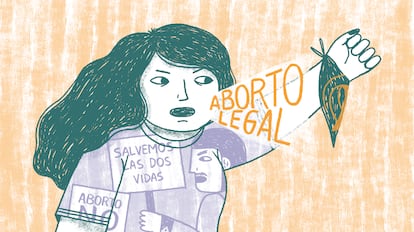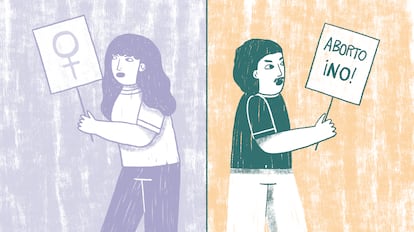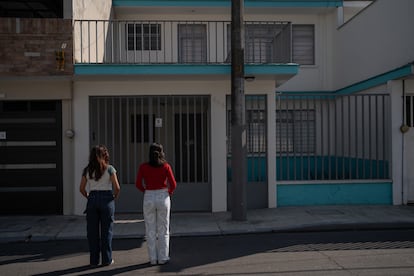From secret sects to street protests: Mexico’s extreme-right targets women
EL PAÍS has accessed dozens of internal documents from El Yunque, which explain the doctrine behind the ultraconservative Mexican sect. Various far-right lobbying and action groups — having infiltrated political parties and civil society organizations — are united in a strategy to impose an agenda against abortion, equal marriage and the fight for LGBTQ+ rights
“Are you pregnant? Do you feel trapped and want to escape reality? There’s a solution: call us. Absolute discretion.” The phrase — printed on stickers that were displayed in the streets — was used by Mexico’s extreme-right for more than two decades, as they operated secretly in opposition to women’s rights. Behind the stickers were ultra-conservative organizations, which sought to deceive women and girls who wanted to get an abortion. When they called looking for help to terminate their pregnancy, those who answered would harass them, until they gave up.
Nowadays, these organizations no longer need to pretend. Years ago, the clandestine groups discovered that raising their voices publicly could be more profitable. They began demonstrating in public. Last year, they went as far as trying (unsuccessfully) to register a presidential candidate who would represent them — someone from beyond the traditional parties. While the far-right still have limited support in a country of 126 million inhabitants, they’ve become emboldened, operating openly in political spaces, as they attempt to implement their agenda: the prohibition of abortion, denial of equal marriage rights and opposition to LGBTQ+ rights.
The discussion about whether to operate openly or to keep a low profile began in the far-right several decades ago. The debate strained the relationship between the founders of the National Front for the Family — the historic, ultra-conservative organization that agitates against abortion and equal marriage —, according to one of them, who prefers to remain anonymous. The argument dragged on for years, without reaching a clear conclusion. In recent times, however, and in the shadow of the new right-wing wave sweeping across Latin America, new groups have emerged, formed mainly by dedicated young people who campaign for the same decades-old ideas. They’re now fearlessly advocating for their views with a loudspeaker in-hand, certain that the more attention they attract, the more support they’ll get.
The past:
The papers from El Yunque
Five decades ago, a faction of Mexico’s extreme-right took refuge in secret sects, such as El Yunque (in English: The Anvil). Founded in the city of Puebla in 1953, its members — who were forbidden from speaking about their organization in public — swore loyalty to each other in extravagant rituals, which involved self-flagellation. They used false names, while the strongest became “combat warrior monks,” who clashed in the streets with Freemasons and members of Opus Dei. They infiltrated civil society organizations and political parties, attacking those who were considered “enemies,” including socialists, pro-choice activists and members of the LGBTQ+ community, according to what a former member of the sect told EL PAÍS. In their strongest era — during the presidency of Vicente Fox (2000-2006) — members of El Yunque held positions in the federal government and opened their own universities.
Under the wings of El Yunque, several civil associations were created, which were used as fronts by the group. EL PAÍS has managed to access dozens of internal documents from El Yunque, which explain the doctrine of the secret sect in detail. One of these papers notes how they had to operate outside the order, either via lobbying or action groups, as well as by infiltrating or creating journalistic publications and institutions. And, from there, they worked in favor of “the cause” (referring to the imposition of the “kingdom of Jesus Christ on Earth”). The objective, according to one of the documents, was “to participate in temporal [affairs] according to Evangelical principles, by carrying out a political vocation.”
That same guide indicates that, as part of the national strategy, El Yunque should create four (supposedly) civil organizations. One was the historic Provida, which received money from the Fox administration and whose leader ended up in prison for embezzlement. Two other organizations — the APN Citizen Coordinator and the Testimony and Hope Movement — are currently defunct. The last one, Acción Juvenil (in English, Youth Action), remains active and has openly supported opposition candidate Xóchitl Gálvez’s presidential campaign. The four groups were all active in conducting operations against women’s rights.
Diego Gil — the fictitious name given to him in the sect — joined El Yunque in 2002. He eventually became secretary of the Interior, a mid-level position in the group’s structure. He handled secret information, was in charge of part of the instruction that was given, and organized initiation ceremonies. Now a former member, he tells EL PAÍS that he was one of the people who posted those infamous stickers in public, to deceive pregnant women. “[The building we directed them to] looked like an abortion clinic. The girls came and we told them: ‘Look, this isn’t an abortion clinic — we’re going to show you your baby and you’re going to see the alternatives you have,’” he recalls.

One of the documents accessed by this newspaper, called the Leadership Manual, details the ultra-conservative doctrine behind this issue: “The defenders of abortion have attempted to cover up its criminal nature through confusing or evasive terminology, hiding the murder with jargon such as ‘voluntary interruption of pregnancy’ or under concepts such as ‘the right to choose’ or ‘the right to reproductive health.’” Along these lines, the manual prepared the heads of the secret order to face societal discussions and to convince the public that terminating a pregnancy was wrong, even when it endangered the life of the mother or was the result of rape.
To attack women’s rights, the doctrine circulated the false narrative that it was “extremely rare” for women and girls to become pregnant after rape due to the “extremely high” rates of sexual dysfunction that rapists supposedly have. “It’s obvious that the horrific crime of rape is used to raise public [opinion] in favor of abortion, by presenting the innocent fruit of a possibly brutal conception as an aggressor,” the document reads. “It’s clear that the woman has suffered a horrible attack, that of rape. Presenting abortion as a ‘solution’ is saying that one poison must be combated by applying another,” it adds. All of this information has been rejected by scientific studies and human rights organizations that operate in Mexico, one of the countries with the highest level of pregnant minors. In fact, all such cases in Mexico are considered to be rape, because girls and adolescents cannot give consent, according to federal law. Additionally, abortion in cases of rape is legal throughout the country.
El Yunque instructed its followers to combat what it described as “lies” pushed by society, such as the right to make decisions about one’s own body, or the idea that legalizing abortion reduces unsafe clandestine abortions. The arguments that El Yunque’s leadership made were unusual, based on ideas far from science. For example, when faced with the argument that each woman can make decisions about her own body, they maintained that, if the fetus in a mother’s womb eventually developed into a female, according to the logic, the woman would have no right to choose (one cancelled out the other). Or they claimed that someone who “violated nature” with an abortion increased “their own potential for violence and spread it to society.” They also claimed, without any evidence, that “in countries where abortion is legalized, parental violence against children increases — especially that of the mother against her children — even when they’re [conceived via] planned [pregnancies].”
Lies pushed by society,
according to El Yunque

"LIE"
It’s inhumane not to legalize therapeutic abortion, which should be performed when a pregnancy puts the woman in danger of death or serious harm.
“The truth," according to El Yunque: The term "therapeutic" is used in order to confuse the public. “Therapy” means to cure… and, in this case, abortion doesn’t cure anything. Currently, medical science guarantees that there are practically no circumstances in which one should choose between the life of the mother or the life of the child.

"LIE"
It’s brutal and inhumane to allow a woman to have a child resulting from rape; therefore, in these cases, so-called “sentimental” abortion should be legalized (El Yunque created this term to replace the correct term: “elective abortion”).
“The truth," according to El Yunque: First of all, pregnancies that follow rape are extremely rare. For example, there’s an extremely high rate of sexual dysfunctions in rapists. The victim may be naturally sterile; she may be very young or very old, she may already be pregnant, or there may be other natural reasons. The menstrual cycle – controlled by hormones – is easily distorted by emotional stress and can act to delay ovulation. Or, if the woman has already ovulated, menstruation can occur prematurely...

"LIE"
Abortion must be legal because every child must be wanted.
“The truth," according to El Yunque:This is an absurd argument. The “desire” or “non-desire” [to have a child] does not in any way affect the dignity and intrinsic value of a person. The child is not a “thing” whose value can be decided according to [a woman’s] mood. On the other hand, the fact that a woman isn’t happy with her pregnancy during the first months doesn’t indicate that this same woman won’t love her baby once it’s born.

"LIE"
Abortion should be legal because a woman has the right to make decisions about her own body.
“The truth," according to El Yunque: It shouldn’t be legal when common sense and modern science recognize that, in a pregnancy, there are two lives and two bodies. A woman – according to the dictionary definition – is a “female human being.” Since sex is determined chromosomally at conception – and since about half of those who are aborted are “female human beings” – obviously NOT EVERY WOMAN HAS THE RIGHT TO CONTROL HER OWN BODY.

"LIE"
With the legalization of abortion, clandestine abortions would end.
“The truth," according to El Yunque: Statistics in developed countries show that this isn’t the case. On the contrary, the legalization of abortion makes it a method that seems morally acceptable and, therefore, it becomes a possible option… one that isn’t equally considered in jurisdictions where it isn’t legal.
The present:
The new far right
The new far right in Mexico has taken over the loudspeaker, holding public rallies and making noise to appear stronger than it really is. In 2022, various far-right groups gathered at the Conservative Action Political Conference (CPAC) in Mexico City, where they invited important figures from the global far-right movement. The following year, conservatives tried to promote the independent presidential campaign of Eduardo Verástegui, but he was ultimately left off the 2024 presidential ballot, due to a failure to collect sufficient signatures. Since President Andrés Manuel López Obrador’s term began in 2018, Mexico’s far right has held public demonstrations against his administration.
Far-right groups have tried to gain space on the political scene, by latching on to current social movements. “The extreme-right uses opposition issues to present themselves as having greater strength than what they actually have,” says Reynaldo Ortega, a researcher at the College of Mexico. That’s why they’ve been seen joining an array of demonstrations, such as the marches in defense of the National Electoral Institute, or the protests against the new school textbooks, which teach about feminism and present various types of families, such as single-parent families. Along these lines, one of the groups that agitated most vehemently against the school textbooks introduced by the López Obrador administration was the National Front for the Family.
Far-right groups have tried to gain space on the political scene, by latching on to current social movements
Speaking out loud about “the defense of life” has yielded some fruits. Small armies of young people dressed in light blue have taken to the streets to condemn abortion in Mexico, after the Supreme Court decriminalized the medical procedure in September 2021. One of those young people is Jorge Luis Pimentel, a law student at the National Autonomous University of Mexico (UNAM) and director of ProLife Army in Mexico City. Catholic, anti-feminist and anti-choice, Pimentel joined the organization back in 2021. In an interview with this newspaper, the young man says that ProLife Army was born “to handle the political aspect that pro-lifers hadn’t covered until then.” The idea was that “they could occupy spaces” on the political stage.
Much of ProLife Army’s work has been to approach local and federal legislators, in order to lobby to prevent the advance of progressive policies in Mexico. “The approach is focused on trying to collaborate with [policymakers], to try to stop these initiatives or seek to repeal them,” Pimentel notes.
The new far-right groups have whitewashed their strategies like never before. On its website, one of the associations that participated in the CPAC in Mexico details what its three principal goals are: conquering spaces and voices in the media; approaching “people who influence the political life” of the country to promote “initiatives that seek the common good”; and offering workshops and seminars to reach the public.

The traditional right-wing party in Mexico — the National Action Party (PAN) — failed to accommodate many of the far right’s ambitions when it was in power (2000-2012). In a study published in November 2023 by the Friedrich Ebert Foundation (FES) — associated with the Social Democratic Party of Germany —, researcher Rodrigo Castro explained that “from the perspective of the radical right, the PAN didn’t decisively channel its programmatic agenda into sociocultural issues.” He points out how the party limited itself to opposing abortion and defending traditional marriage. Hence, the extremist currents moved away from the PAN, first shifting towards the National Front for the Family, before the emergence of today’s independent cells.
Alice Galván was one of the people who moved away. A former advisor to a PAN senator, Galván was the one who put the conservative party in contact with Vox, a far-right Spanish party. This opened the door to Vox leader Santiago Abascal visiting the Mexican Congress, where he took photos with leaders of the PAN and got some factions to sign the Madrid Charter. This document — circulated by a foundation associated with Vox — warns against the “rise of communism.” The controversy that the photos unleashed eventually pushed the PAN to rectify its position and distance itself from the global far-right movement.
Disillusioned, Galván ended up leaving the party. She now directs the conservative think tank Patria Unida (in English, United Homeland), which she created after taking some courses in Spain offered by Vox. On its website, the organization has attacked Mexico’s new school textbooks and has defended the idea of marriage being “between a man and a woman.”
When Galván left her party, she told her boss: “The PAN doesn’t realize that it’s been affected by moving away from its principles. [The party is] trying to enter a terrain where it won’t get any votes, because there are eight other political parties that have always defended [the same ideas].” She’s not the only one who believes this. Many actors from the Mexican extreme-right have complained about the fact that the PAN chose to enter into a coalition which is fielding Xóchitl Gálvez as a candidate. The former senator — who is in favor of abortion rights — has positioned herself as a feminist in the 2024 presidential elections.
“In politics,” Galván emphasizes, “spaces aren’t left empty. The PAN has left the right [vacant], so today, there are people working to occupy that space.”
Family,
before everything
Ultraconservative gatherings in Mexico now take place in broad daylight. During the first weekend of March, the far-right lobby met in Guadalajara, to celebrate what it considers to be its main value — the nuclear family — at the International Congress of Families. One weekend every year, in the same place where some of the brightest minds in literature from around the world attend the Guadalajara International Book Fair rubber fetuses are proudly displayed to impress visitors of a different sort. “Don’t let anyone tell you that it’s not a life,” a promoter warns.

Around 8,000 people walked through the halls of Expo Guadalajara that weekend, including officials from the state governments of Aguascalientes and Jalisco. There were also numerous members of the Catholic Church — especially the Legionaries of Christ — and academics focused on “rescuing” traditional marriage as an institution. There were even those who cited Agustín Laje, a writer from the Argentine extreme-right known for his homophobic and anti-choice views. All those present shared the same objectives: attack gender ideology and feminism, discredit the rights of the LGBTQ+ community, apply religious morality to women’s bodies and combat sexual education. “Instead of being educated, children are being sexualized,” one of the speakers roared, generating hysteria in the audience.
Rodrigo Iván Cortés — president of the National Front for the Family and a former federal legislator for the PAN — gave one of the most-applauded talks. After giving a tragic and off-the-cuff diagnosis of what Mexico is going through, he said that a state of political correctness had been established in the country — “which is utterly anti-human and anti-Christian” — and that an “ideology of confusion” had been imposed on the subject of gender.
Not long ago, these ideas weren’t discussed in public. But all of a sudden, they were the focus of long, explicit speeches on stage. “A culture of death is growing, which seeks to normalize the murder of the most vulnerable with abortion. This is nothing other than promoting [the idea that] mothers can kill their children,” Cortés claimed.
Among the stands at the International Congress of Families, you could find everything from major media outlets to publishing houses. There were also nationally recognized anti-abortion groups, or associations dedicated to lobbying for conservative policies. One platform — Saber Votar (in English: Know how to vote) — runs a website about how to “make informed decisions” in this year’s elections.
Operating
in all corners
Away from the spotlight of politics, some parts of the country continue to live in the heat of the far-right misinformation campaigns and harassment operations conducted against women who want to have an abortion. EL PAÍS has been reporting on this since 2021.
A feminist group in the state of Veracruz — Marea Verde-Altas Montañas — has been able to document how this operation works in the city of Orizaba. Two associations, both of which hid behind feminist slogans on social media, were working out of a house downtown. In a strategy similar to the one that El Yunque applied for decades, they made the women who approached them believe that they were going to receive help in getting an abortion, but they ultimately did the opposite.
Two feminist activists — who prefer to remain anonymous for safety reasons — managed to sneak into the house, posing as young pregnant women who wanted to end their pregnancies. They scheduled appointments via WhatsApp and showed up at the property, which, at first glance, resembles an ordinary house. A supposed doctor was waiting for them.
The episode that they both experienced lasted at least an hour, in which they were subjected to pressure to not terminate their pregnancies. They were even shown videos with macabre images of what would happen if they opted for abortions.” They make you sign a sheet and write down all of your personal information; that’s where the manipulation begins,” one of the young women says, in an interview with EL PAÍS.

“Do you know that you’re going to bleed to death?” “If you abort, your parents will notice.” “You’re going to commit murder.” These are just some of the phrases that the two young women remember hearing at the house
“Do you know that you’re going to bleed to death?” “If you abort, your parents will notice.” “You’re going to commit murder.” These are just some of the phrases that the two young women remember hearing at the house — words that sound unreal in a country that decriminalized abortion in July 2021. They were also offered transportation to another state, to put the baby up for adoption after giving birth. “You leave [the center] in a state of trauma, because it’s all very gory. They put you in a position as if you’re a murderer, stupid, crazy, selfish,” one of the activists recalls.
Plans
for the future
Mexico’s extreme-right is divided into cells, each with its own objectives and projects. For instance, not even all of the groups agreed to support Verástegui’s candidacy. Some far-right blocs chose to join the broad-based opposition coalition, which is principally made up of three traditional Mexican parties. Division has been one of the far right’s biggest obstacles.
The electoral system has also been a challenge for their aspirations. In order for a person to run as an independent presidential candidate, they must collect enough signatures equivalent to 1% of the total number of citizens who have the right to vote — which means close to a million. And those who sign must be distributed equally between at least 17 of Mexico’s states, which presents obstacles for a candidate who doesn’t have the infrastructure of a traditional party. In the end, Verástegui hit the wall, only managing to collect a tenth of the signatures that he needed to register.
I do believe that there's a possiblity in the future, but not anytime soon, says Galván, maybe by 2030 there could be a big push to have a right-wing political party, or at least we could pressure the PAN to return to this side
“I do believe that there’s a possibility in the future, but certainly not anytime soon,” Galván affirms. “Maybe by 2030 there could be a big push to have a right-wing political party, or at least [we could] pressure the PAN to return to this side (the hard right).”
The extremists who opted to stick with the opposition coalition have ended up better off. Historical members of El Yunque hold important places in the Broad Front for Mexico in states such as Puebla. There, they will accompany the candidate for governor, Eduardo Rivera, who has often been identified as a member of the ultra-conservative sect.
For Mónica Silva — a state legislator from Puebla, affiliated with the Labor Party — El Yunque and the far right have managed to infiltrate all the political parties in the state, putting pressure on Congress of Puebla to stop pro-choice initiatives. As an example, she notes, it hasn’t been enough for half of the state legislature to be female and leftist to prevent the group’s influence.

“The extreme-right has permeated MORENA (the National Regeneration Movement, the ruling party),” Silva laments, “and the agenda for women has become uncomfortable.” The Congress of Puebla has recently seen the tabling of a bill for the unborn and another for the regulation of educational content by parents, both initiatives promoted by the PAN. However, despite the fact that pro-choice legislation has been held up at the local level, Governor Sergio Salomón was forced to open seven reproductive healthcare clinics in December 2023. Among other duties, these clinics will help carry out the termination of pregnancies, in compliance with a ruling made by Mexico’s Supreme Court. This measure has caused disputes within the state administration, especially since members of the extreme-right have infiltrated the Governor’s Office, according to local feminist activist Socorro Quezada. “The entire conservative wing holds key positions.”
This report was produced with the support of the International Women’s Media Foundation (IWMF) as part of its Reproductive Health, Rights and Justice in the Americas initiative.
Creditos
Sign up for our weekly newsletter to get more English-language news coverage from EL PAÍS USA Edition

